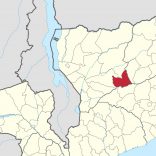Türkiye awarded 40 Mozambican students with university scholarships
More than half of Sub-Saharan African countries classified as “authoritarian regimes”, Mozambique included

File photo: Lusa
Democracy in sub-Saharan Africa deteriorated in 2020, with most regimes in the region now classified as “authoritarian” by the 2020 Democracy Index, released on Wednesday.
Prepared annually by The Economist’s Intelligence Unit, the index measures levels of democracy in 167 countries and territories.
The average score of the 44 sub-Saharan countries assessed dropped from 4.26 in 2019 to 4.16 in 2020 , the lowest average recorded in the region since the index was first published in 2006.
Sub-Saharan Africa has only one “full democracy” – Mauritius – and only six “flawed democracies”: Cape Verde, Botswana, South Africa, Namibia, Ghana and Lesotho.
Another 13 countries in the region are classified as “hybrid regimes” – two less than in the 2019 index – with Burkina Faso and Mali downgrading to “authoritarian regimes”, bringing to 24 the countries in the region ranked as such.
Among these 24 “authoritarian regimes” are Portuguese-speaking countries Angola, Mozambique, Guinea-Bissau and Equatorial Guinea.
According to the index, Burkina Faso and Mali were both demoted from “hybrid regimes” to “authoritarian regimes” because “none of the governments has full control over their territory, and insecurity in Mali precipitated a coup in August, 2020”, the military having governed the country since then.
Mali fell 11 places worldwide, the second-biggest drop in the sub-Saharan region after Togo, which fell 15 places as a result of “deeply fraudulent elections and repression of the opposition”.
The regional deterioration also resulted from the decline in scores related to the “electoral process and pluralism”, with the average regional score for this criterion falling to 3.87 (4.01 in 2019).
Irregularities in voting during elections in Tanzania and Guinea-Conakry led both countries to fall in the index. One positive, however, was the cancellation and re-running of the presidential elections in Malawi, which pushed the country up five places in the global ranking.
The decline in the global score for democracy in Africa in 2020 was also driven by the restrictions imposed in the context of the Covid-19 pandemic, the index points out, saying they had a negative impact on the “civil liberties” criterion, the region’s score falling from 4.46 in 2019 to 4.23 in 2020.
According to The Economist Intelligence Unit analysis, there was a strategy of “relentless application” of confinement and curfew measures in Africa, with several countries, such as Nigeria, Kenya and Senegal, further tightening police repression of populations.
“The harshness of the restrictions led people to disregard them, and there were protests and riots in some countries, including in some with a history of only limited political participation, such as Uganda and Angola,” the report signals
“In Angola, the unrest was also related to the postponement of local elections,” it adds.
The index also points out that restrictions on political activity were “applied disproportionately to the opposition” prior to the January 2021 elections in Uganda, a case which, according to the analysis, illustrates how autocratic regimes “use the excuse of new threats like the coronavirus to repress opposition and maintain power during a period of crisis”.
Overall, the average score for the 167 countries and territories dropped from 5.44 to 5.37, the worst score since the first edition of the index in 2006. The vast majority of countries – 116 out of 167 (almost 70%) – experienced a decline in their total score compared to 2019.
Norway topped the latest index, titled “Democracy: In sickness and in health?”, with Iceland, Sweden, New Zealand and Canada making up the top five. Taiwan, Japan and South Korea took the top three spots in Asia, moving from the “flawed democracy” category to be classified as “full democracies.”
Out of 167 countries, the Democracy Index classifies 23 countries as full democracies, 52 as flawed democracies, 35 as hybrid regimes and 57 as authoritarian regimes. India was classified as a ‘flawed democracy’, along with the US, France, Belgium and Brazil, among others.
The Economist Intelligence Unit’s Democracy Index is based on assessment in five categories: electoral process and pluralism, government functioning, political participation, political culture and civil liberties.
The index portrays the current state of democracy in 165 independent states and two territories, classifying 60 indicators on a score scale of 0 to 10.
Based on the total score, countries are classified as one of four types of regime: full democracy (scores above 8), flawed democracy (scores above 6), hybrid regime (scores above 4) and authoritarian regime (scores of 4 or less).












Leave a Reply
Be the First to Comment!
You must be logged in to post a comment.
You must be logged in to post a comment.